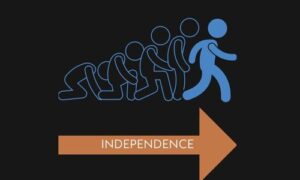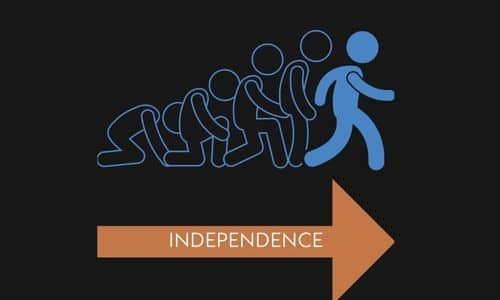
When does one able to master independent living? What does it look like? How does one achieve it? These are questions that both young adults and their parents often ask. There aren’t clear answers because everyone’s journey looks different. In this blog, we will first discuss the different perspectives of young adults and their parents. We will then go through three pillars of independence: life management, social engagement, and career navigation.
Differing Perspectives – Young Adults vs. Parents
Young Adults
Independence is a new thing for young adults. They haven’t lived and breathed the experiences yet that their parents have. For them, independence is a great unknown. Often, young adults don’t realize everything that goes into being an adult. There are little details, like how to organize your kitchen cabinets. I recently worked with a client who is moving out, and he was overwhelmed by the amount of little details he has taken for granted. The silverware was always in its drawer, and the thought of how that came to be never went through his head.
It’s important to keep this naivety in mind. To the young adult, sharing advice on independence before it happens can come across as preachy. Keep in mind that the most advantageous areas to focus on are those that are ‘real’ to them (e.g. doing their own laundry, since this is something they can actually do prior to moving out).
Parents
Many parents (and all adults), develop their independence over the course of many years. We tend to forget this, thinking we always had these skills. Think back to your 20s, was it all smooth sailing? Speaking for myself, there were plenty of trials and tribulations. The thing about early adulthood is that all of these challenges were learning opportunities. Many parents can forget that things weren’t perfect, and when looking at their growing children, can push for them to adopt their own strategies for independence.
Parents need to understand that they came to those strategies through trial and error, and that you were convinced to adopt those strategies through trial and error. Although you may not want your kids to go through the same struggle, that struggle was a necessary part of your own journey towards independence, your kids deserve the same journey.
Now that we understand the different perspectives, let’s breakdown the pillars of independence to better understand the journey towards independent living, and ways that young adults build these skills, along with an understanding of how to support the development of these skills.
Pillars of Independence
Life Management
Where to even begin! So much goes into managing your own life. From food shopping to cooking, laundry and organizing clothes, medication management to handling doctor appointments, budgeting your money to paying bills. What about taxes, or investing your money? We could go on and on, and I don’t mean to share all of these things to overwhelm anyone reading this. The purpose is to show that you can’t prepare someone for all of the things life throws your way. As the old saying goes, “If you give a man a fish, you feed him for a day. If you teach a man to fish, you feed him for a lifetime.” To extend the metaphor, learning to fish can be related to learning how to develop your own problem solving skills. There are opportunities to certainly teach each of these skills, and some will benefit from this explicit instruction, but the goal shouldn’t be to teach all of these skills before our young adults go out into the world. Rather, efforts are better spent on helping young adults identify problems so that they can seek out help as needed.
Teaching young adults to problem solve and adapt will go much further in supporting their independent living skills. I do want to also share that there are certain skills that should be learned before the journey towards independence takes that leap towards living on your own. There are certain things that can endanger individuals. For example, learning how to manage your own medication is an important skill to master prior to living independently, because the consequences of not doing so may be too extreme for a learning opportunity. Other things, like what to do during a fire, or how to use a stove are also important.
Social Engagement
Humans are social beings, and everyone has different social needs. Social needs can vary between individuals, such as some being content with a handful of friends, while others may only be content with a lot of friends. Some people desire virtual connections, and others may need that in-person connection. Social engagement, as a pillar towards independence, is key because it gives us senses of belonging (think Maslow’s hierarchy of needs). For some people, learning social engagement is necessary because it can be too easy to isolate ourselves. When living independently, there is no one else making plans for you, or identifying social opportunities. There are executive functions involved in the planning and implementation of social plans that can be taught.
For social engagement, one of the most important things to teach young adults is that what is most important is what they want from social engagement. This is what makes it motivating to achieve. Too often people have ideas of what being social means, and they can try and force something that isn’t really motivating to them. When you pull back the societal expectations, you can really help people begin to build up their social engagement skills, because they are now motivated towards the outcome!
Career Navigation
Career navigation is a complex set of skills, ranging from the skills needed to find employment to the skills necessary to excel within a work environment. In terms of excelling in a job, these skills can take an entire lifetime to master. Excelling in a job is not necessary for independence, but the ability to find employment and maintain it is. Securing income is essential to independence. Learning how to seek out, apply, interview, and secure employment are a set of skills that are experiential in nature. It is hard to help someone practice interviewing, without the aspect of interviewing with a stranger (sorry parents, all your offers to practice together aren’t providing a good example of what is to come!). When supporting individuals with discovering their process for cover letters or interviewing strategies, it’s important to keep in mind that everyone is different. Learning how to interview is about finding what strategy works best for you, that way you are comfortable and confident. The best support to finding this strategy and approach is to continually practice and reflect, fine tuning your approach. In terms of employment maintenance, this is another skillset that requires a lot of reflection. All bosses are different, and learning to read the situation, reflect on it, and adapt is necessary. Supporting independence is rooted in learning how to reflect and adapt.
To summarize, the key to the journey towards independent living, is supporting individuals to navigate the journey as independently as possible. This doesn’t mean removing struggle; it means that struggle is an essential part of developing independence. Our goal in supporting young adults is to arm them with the tools to navigate, learn from, and adapt in response to struggle.
New Frontiers offers coaching in each of the three pillars discussed in this blog, along with a group program designed to support all three of them.





